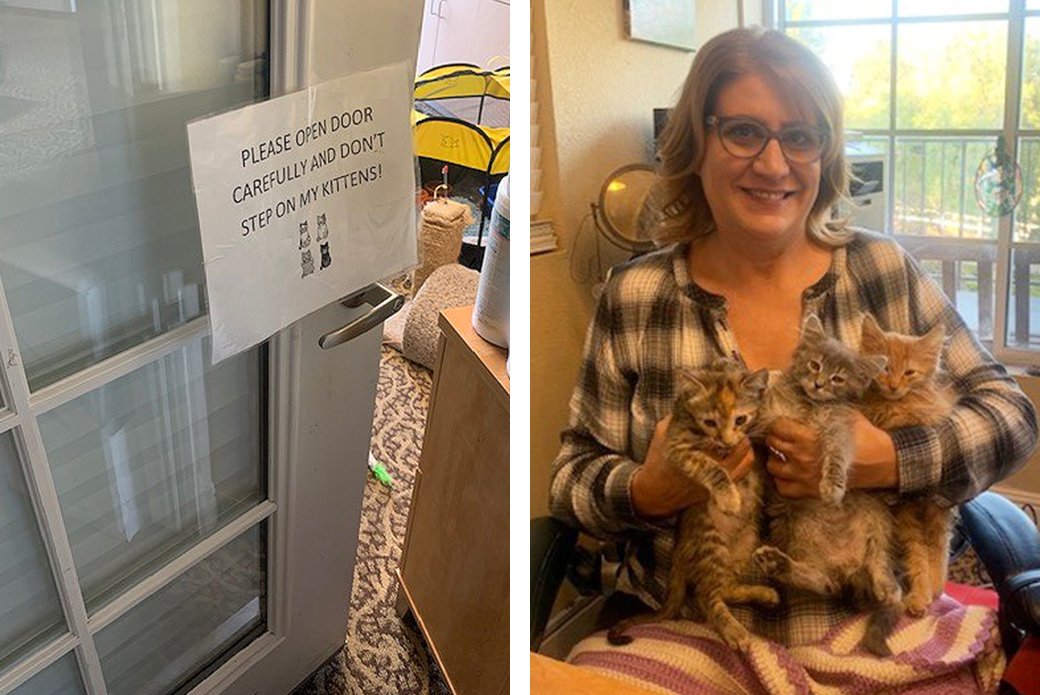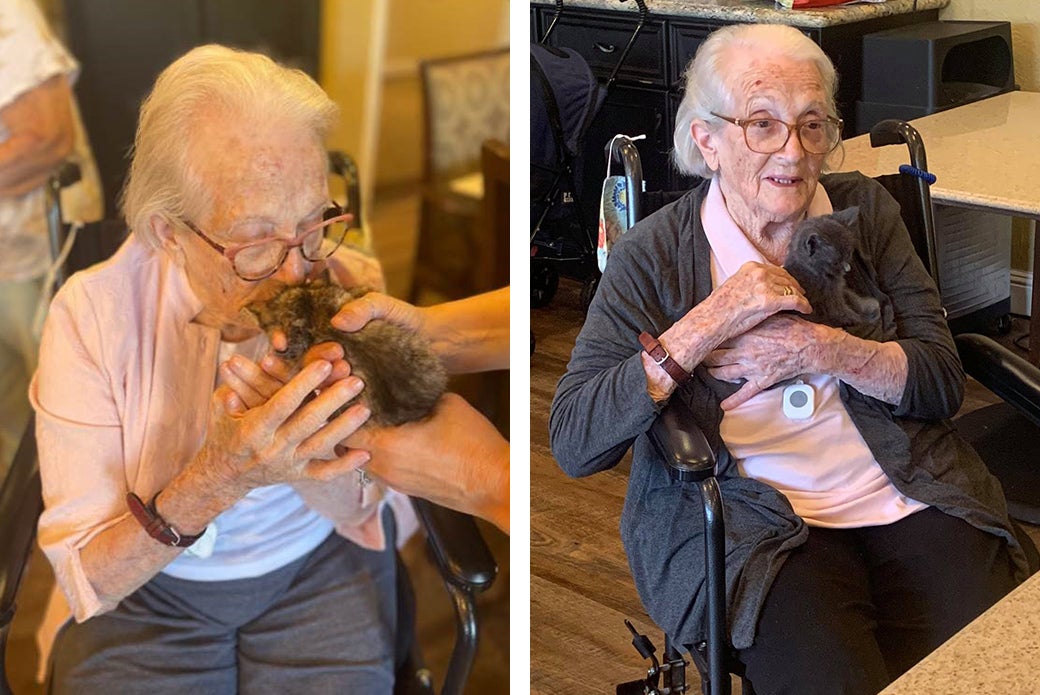

The sign on Lori I.’s office door reads, “Please Open Door Carefully and Don’t Step on My Kittens!”
One might expect to see that message in an animal shelter or cat cafe. But Lori, Business Office Manager at The Meridian at Anaheim Hills, a senior living community in Anaheim, California, has turned her office into a kitten playground, complete with scratching posts, litter boxes, cat toys and a playpen.


Lori, who has worked at The Meridian for nearly six years, is also a foster caregiver for the ASPCA’s Los Angeles Foster Program. She takes each litter of kittens to work so they can meet and interact with residents and co-workers.
“I have so many people in and out of my office all day,” says Lori, who has fostered 32 kittens since 2019. “The residents and staff provide a good socialization experience for the kittens and vice versa.”
Kittens Join the Community
In addition to bringing her fosters to work Monday through Friday, each Wednesday at The Meridien is “Kitten Therapy Day,” when time is scheduled for residents to meet and play with Lori’s kittens.
The ASPCA ensures that kittens are healthy and vaccinated, and Lori keeps their nails trimmed. Lori also makes sure the kittens are comfortable being handled before she introduces them to residents. She puts the kittens in a stroller, wheeling them into the areas of independent living, assisted living and memory care.
“I make sure there is one employee for each kitten, who then introduces that kitten to a resident,” says Lori, who knows each kitten’s personality and how they prefer to be handled. “If a kitten gets too squirmy or restless, I put her back in the stroller or in my office, and I give them another one.”
Estelle N., 98, hardly ever misses a session.


“She may be tired and grumpy, but I say, ‘Mom, the kittens are here,’ and she jumps out of bed like Superman,” says Estelle’s daughter, Cathy. “It makes a huge difference in her day.”
Another resident, Angela S., says she can’t wait to see the kittens every week. She is among several residents who stop by Lori’s office during the week to get their daily “kitten fix.”
Kitten therapy sessions last as long as the kittens can hold out, which is usually about 45 minutes. Then they go back to Lori’s office for a catnap.
“I get a pretty good group—often the same people over and over,” says Lori. “Some residents even bring family members to my sessions.”
Sheila B., Executive Director of The Meridien at Anaheim Hills, estimates that more than half of the facility’s 200 residents—and most of its 100 employees—have been impacted by kitten therapy.
“Their faces really light up,” says Sheila, who has worked in senior living communities for 13 years. “Especially those in memory care. It brings back memories of their own cats and pets. When they hold them, the kittens purr. It’s really sweet.”
During the pandemic, when the facility was locked down and visitors were limited or not allowed, Lori’s kittens picked up the slack.
“They really helped cheer up residents during COVID,” says Sheila, noting that other pet therapy sessions with outside volunteers had to be canceled. “They’re a blessing to so many people.”


The Meridian at Anaheim Hills is one of 80 retirement community properties in the U.S. operated by Pacifica Senior Living.
“We’ve had a lot of success with pet therapy,” says Sheila, adding that dog therapy is common. “We even have a resident dog, a Labradoodle named Puck, who grew up here. Animals provide such a level of comfort and good feelings.”
Roughly one-third of the residents have pets of their own.
“We recognize pets are family,” says Sheila. “And our corporate offices want us to operate at the community level.”
The Cats Get New Careers
Lori, who lives with her twin daughters, Kellsey and Kaylee, and three cats, Oliver, Jasper and ’Nillabean, didn’t think she had the space or time to foster until got an email about the ASPCA’s Los Angeles Foster Program.
She asked Sheila if she could bring kittens to work because she didn’t want to leave them home alone for so many hours during the day.
“I’m an animal lover and was pretty open to it,” says Sheila, who has two cats of her own.
“I got an email from Sheila saying ‘yes,’ and she’d even provide a playpen—that’s all I needed to hear,” says Lori.
Lori’s current litter of kittens—two females, one male; born August 10—were under-socialized when she picked them up September 7 at the Downey Animal Care Center where they were dropped off as strays.
“Lori likes the challenge of socializing kittens,” says Nadia Oseguera, ASPCA Senior Manager of Foster Care in Los Angeles. “A week after she got them, they improved 180-degrees and were confident and playful.”
Lori completed the ASPCA’s “Lion Tamer” training, launched in 2020, which trains fosters on how to socialize kittens.
“Under-socialized kittens rely on people like Lori,” says Nadia. “For example, a well-socialized kitten would likely enjoy being held and cuddled. But people sometimes don’t realize that just because they can hold and cuddle an under-socialized kitten, it doesn’t mean the kitten enjoys it. Lori pays attention to their body language and gets them used to people at their own pace.”


While Nadia says that Lori’s using kittens for therapy is new to the ASPCA, the ASPCA is not opposed to foster caregivers taking their kittens to work as long as the environment is safe.
Tina Reddington Fried, Director of the Los Angeles Volunteer & Kitten Programs, says that caregivers of bottle babies (kittens under four weeks) are encouraged to take foster kittens to work since they sleep most of the day and take up very little space in a carrier. They also need to be fed every two to five hours. Ongoing monitoring is essential to ensure kittens are kept warm and fed and medical concerns are flagged immediately.
“Once kittens cross the two-week-old threshold, they’re ready for socialization,” Tina says. “It’s imperative they have many positive experiences with humans before they reach seven weeks. This ensures an easy and comfortable transition into a future adoptive home.”
Making A Difference for Kittens
Since 2017, nearly 7,000 kittens from Los Angeles County animal shelters have entered the ASPCA’s Pee Wee Foster Program; this year, 1,300 have entered the program, including Lori’s litter.
“We had an increase in fosters in 2020, but now that people are returning to work, it’s dropped,” says Nadia. “We could definitely use more fosters and urge people to apply.”
Some foster caregivers like Lori help find homes for their kittens, alleviating another burden for the ASPCA.
“I’ve done pretty well finding placements for most of mine,” Lori says. “Usually it’s someone I work with, or a family member of a resident. Everyone knows someone who wants a kitten. And I know their personalities so I can match them up really well.”
Even one of Sheila’s cats, Luna, was a foster kitten from one of Lori’s previous litters.
“Kitten therapy is a great way to network and try to find them homes, while providing comfort and companionship to our residents,” says Sheila. “More senior living communities should do things like this. It’s significant because people are lonely. The kittens change their mood, their expressions, and their outlook. It’s a win-win for residents and cats alike.”
The ASPCA needs foster caregivers! If you’re interested in making a difference for vulnerable animals in Los Angeles County, click here.
Source: Read Full Article
